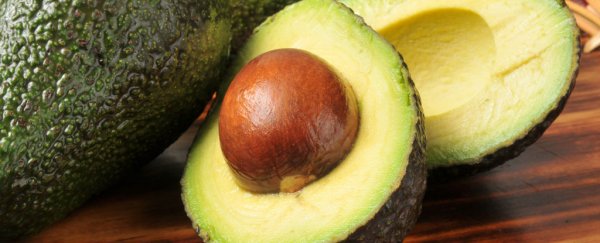With the number of obese people in the world now outnumbering underweight people, we've got a serious problem on our hands. The number of obese people has risen from 105 million in 1975 to 641 million, and scientists are struggling to pin down a cause.
Could it be something we ate? That's what British charity and group of medical experts, the National Obesity Forum and the Public Health Collaboration, is saying in a controversial new report that accuses the UK government of colluding with the food industry to include bogus recommendations in its current dietary guidelines.
The organisation says recommending that people stick to low-fat diets and cholesterol-lowering measures is having "disastrous health consequences", and that the current dietary guidelines set out by the Public Health England - an arm of the UK Department of Health - have been "corrupted by commercial influences".
To get a look at the recommendations in question, download the PDF here. You can see there's a clear focus on low-fat dairy options, including skim milk, soy alternatives, low fat cheese, and low fat yoghurt, and small amounts of unsaturated oils if you're using oils and spreads.
But instead of filling our fridges with 'low fat', 'lite', and 'low cholesterol' products, people should be basing their diet around "whole foods", such as meat, fish, and diary, says the report, and we should embrace - not shun - high-fat, but healthy foods like avocados, because, "Eating fat does not make you fat."
"Eating a diet rich in full-fat dairy - such as cheese, milk and yoghurt - can actually lower the chance of obesity," says the National Obesity Forum and the Public Health Collaboration.
"The most natural and nutritious foods available - meat, fish, eggs, dairy products, nuts, seeds, olive, avocados - all contain saturated fat. The continued demonisation of omnipresent natural fat drives people away from highly nourishing, wholesome and health-promoting foods."
Sounds pretty sensible, right? Well, not exactly, because while praising naturally fatty foods, it also recommends cutting carbs and ignoring calorie counts, stating that "Saturated fat does not cause heart disease, and full-fat dairy is probably protective," and "Starchy and refined carbohydrates should be limited to prevent and reverse type 2 diabetes."
Scientists have been blasting it ever since it came out, because on top of a lack of supporting evidence and peer-review, the report that accuses the UK government of covering up collusions with the food industry is not exactly being forthcoming about its own sources and funding. Critics are now calling it an "opinion piece", rather than a report.
"We fully support Public Health England's new guidance on a healthy diet. Their advice reflects evidence-based science that we can all trust. It was not influenced by industry," Simon Capewell from the UK Faculty of Public Health, told the press.
"By contrast, the report from the National Obesity Forum is not peer-reviewed. Furthermore, it does not it indicate who wrote it or how is was funded. That is worrying."
The problem here isn't that the National Obesity Forum and the Public Health Collaboration is questioning the official recommendations - it's how we go about that and communicate it to the public.
Figuring out what everyone should be eating on a daily basis is an extremely difficult task, especially considering we're all complex individuals, with different lifestyles, dietary requirements, and ailments.
We need to be regularly assessing and revising things as the science becomes more clear, which is what the US government did earlier this year when it revised its dietary recommendations with regards to cholesterol, announcing that it's no longer considered a "nutrient of concern".
But that's the point - if we do question and revise dietary recommendations, we need to do it in a scientific way, with evidence to back up the changes. And while there could be some truth to what the National Obesity Forum and the Public Health Collaboration is saying, they sure know how to obscure the evidence in favour of some over-simplified catchlines.
"Eat fat to get slim. Don't fear fat. Fat is your friend. It's now truly time to bring back the fat," says Aseem Malhotra, consultant cardiologist and founding member of the Public Health Collaboration, adding that dietary guidelines promoting low-fat foods were "perhaps the biggest mistake in modern medical history, resulting in devastating consequences for public health".
This over-simplification is misleading and irresponsible, and attempts to convince the public that the 'cure' for obesity and Type 2 diabetes is as simple as embracing fats. The Royal Society for Public Health in the UK described the report as a "muddled manifesto of sweeping statements, generalisations and speculation".
John Newton, chief knowledge officer at Public Health England, said this in response:
"Suggesting people should eat more fat, cut out carbs and ignore calories conflicts with the broad evidence base and internationally agreed interpretations of it. The report from the Scientific Advisory Committee on Nutrition on carbohydrates alone included around 600 peer-reviewed scientific reports. That review was carried out over a number of years, reflecting how long it takes to thoroughly consider evidence ahead of changing dietary guidelines."
He also addressed the accusations of collusion:
"We engage with a broad range of stakeholders when we make changes to advice, and this includes representatives of the food and drink industry. As the organisation that advises the government on dietary guidelines, it would be irresponsible for us to not engage with those who produce and market the food we all eat."
So let's all just stick to the facts we have right now, and if the scientific evidence says we should be changing what we're doing, let's cross that bridge when we come to it. The National Obesity Forum and the Public Health Collaboration are right about the fact that the rising rates of obesity are a major concern, and the trend has to stop, but facts are the best thing we have to fight it.
